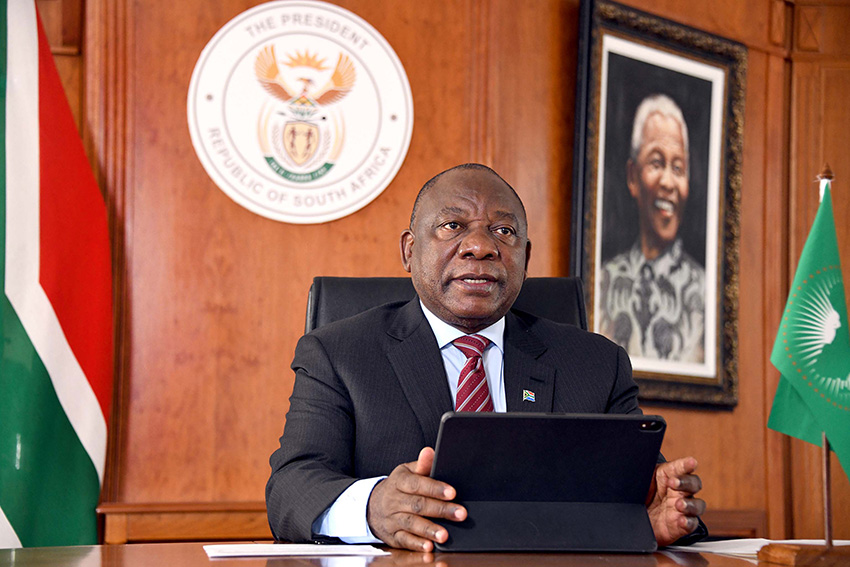AFRICA THOUGHT
– News features, commentaries, analyses, interviews & Op-ed.

South African President Cyril Ramaphosa
By Keith Gottschalk
The South African government has explained that it enjoys good relations with both Russia and the Ukraine; hence it abstained in the UN General Assembly vote condemning the Russian invasion.
President Cyril Ramaphosa subsequently said South Africa abstained because the resolution did not foreground the call for meaningful engagement.
At home, the official opposition, the Democratic Alliance lost no time in taunting the governing African National Congress (ANC) that its abstention was because a Russian oligarch, Victor Vekselberg, had donated R7.5 million to the ANC.
But one cannot assume that a billionaire’s personal views are pro-Putin, merely because he is Russian. Besides, after the
Kremlin jailed and sequestrated the billionaire Mikhael Khodorkovsky in 2005, no “oligarch” will ever again express opposition views in public.
In fact, the moniker “oligarch” is misleading because it implies a wielder of great power in the inner circle. The reality is that Russia’s billionaires possess their wealth solely by the grace of the Kremlin. Like England’s Henry VII, the Kremlin seizes the property of its critics.
Further, reality has many dimensions. And in this case history is relevant. To summarize, the ANC remembers who were its allies during the Cold War, and who denounced it as “terrorists”. This has drowned the other considerations. This includes that South Africa, as a small country, depends on the UN charter principles opposing war and invasion to seize territory, and multilateralism to protect it from invasion by a great power.
Historic ties that bind
The ANC and the former Soviet Union have a long history together. The first visit by an ANC leader to the Soviet Union was by Josiah Tshangana Gumede, one of the founding members of the ANC, in 1927. His visit was a spin-off of his attendance in Belgium of the League against Imperialism.
After the apartheid regime was banned the ANC in 1960 it received aid from the Soviet Union for its exiled mission in the fight to liberate South Africa from minority white rule. This aid exceeded that from the pan-African Organization- now the African Union – or anyone else.
It was only from the end of the 1970s that Scandinavian donations became higher than Soviet funding. But Scandinavian aid remained limited to peaceful aid only. Only the Soviet Union provided weapons and other military aid to the ANC’s armed wing, Umkhonto we Sizwe.
By 1988, sensing that victory over apartheid was coming, Moscow supplemented training in guerilla warfare with training in conventional warfare, including naval and air force training.
Historical links, such as these, were evident in the divide between African states during the UN General Assembly vote to condemn Russia’s invasion of the Ukraine.
Namibia, which is governed by Swapo, Angola, by the MPLA and Mozambique by Frelimo joined South Africa in abstaining.
Swapo, the MPLA, and Frelimo also received Soviet foreign aid during the 20th Century Cold War when they too were liberation movements fighting guerrilla wars.
By contrast, Botswana and Zambia voted to condemn the Russian invasion. Significantly, their ruling parties came to power peacefully, and did not have Russian alliances. This vote for the UN resolution condemning the Russian invasion and demanding its withdrawal, was also the position of 28 African Union members. Seventeen abstained.
Clearly, the liberation movements of Angola, South Africa, Namibia and Mozambique regard Russia as the inheritor and custodian of the Soviet Union history and traditions.
Irony of history
There is some irony in this, as so often in history. While Russian President Vladimir Putin started his career in the Soviet KGB, the political police, he now merits the western saying that there is no one more anti-communist than an ex-communist. In 2017 Putin’s government, supported by his United Russia party, had absolutely zero centenary celebrations of the Bolshevik revolution.
To the contrary, today’s Kremlin ensures that today’s Communist Party of the Russian Federation faces two decades of rigged elections, cheating it of winning the vote in Vladivostok and other towns.
Why then do the ANC, Swapo, MPLA, and Frelimo, and the South African Communist Party – the ANC’s governing alliance partner – continue to retain such bonds of deference to Putin’s anti-communist government?
One reason could be that Russia and those southern African governments have shared resentment of the international dominance of the North Atlantic Treaty Organization (NATO), especially that of the US and the former colonial powers – the UK and French. This is regardless of the sea-change in party politics within the Kremlin.
The relationship between South Africa and the US, especially, has a complex history. Not least because US governments designated ANC leaders fighting the apartheid regime as terrorists. There is also memory of the CIA’s.
Most of the anti-Ukrainian commentary in the South African internet and letters to the editors reflects the commentators’ stance against previous US government foreign policy of wars
in Iraq, Afghanistan and elsewhere. They do not reflect facts unfolding on the ground.
For the governments of South Africa, Namibia, Angola, and Mozambique, the historical alliances and enemies of the last century’s Cold War seem destined to tip the scales when it comes to their voting at the UN, the African Union, and in other forums. This is despite the fact that, as small countries with severely constrained defense capabilities, they depend on the support for multilateralism and the UN system against any invasions by a great power.
Your comments, ideas, and thoughts matter.
Drop us a line: